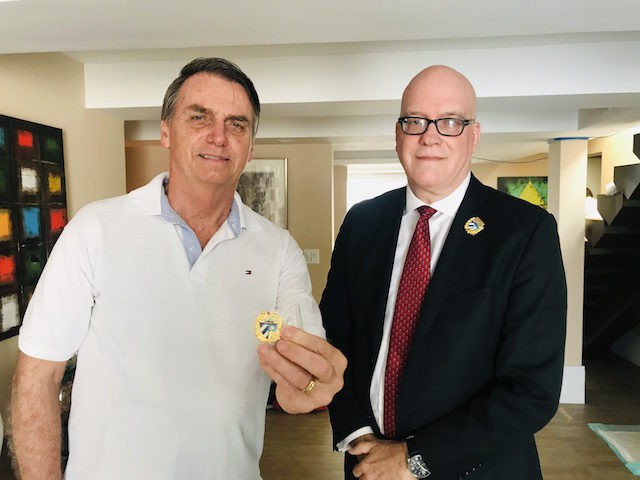Brazil’s President-elect Jair Bolsonaro welcomed Cuban exile leader Dr. Orlando Gutiérrez-Boronat in his Rio de Janeiro home Wednesday to discuss the “atrocities” of the communist Castro regime and how Brazil will lead the region in the struggle against the international left during his tenure.
The meeting, occurring on the same day as Bolsonaro welcomed American Evangelical leaders to pray and discuss faith issues in his home, follows several weeks of Bolsonaro and his incoming administration prioritizing the eradication of leftist ideology from Latin America as a pivotal goal following over a decade of socialist control of Planalto, Brazil’s presidential palace.
On Tuesday, Bolsonaro vowed to do “everything we can within legality, within democracy, against these countries” that continue to promote violent communism and socialism, primarily Cuba and its proxy regime Venezuela.
Bolsonaro posted a photo from his home on Twitter Wednesday morning meeting with Gutiérrez-Boronat in the president-elect’s home.
“Receiving [a visit] from the Cuban Orlando Gutiérrez, one of the primary denunciators of the atrocities committed by the dictatorship of that country,” Bolsonaro wrote.
Recebendo o cubano Orlando Gutierrez, um dos principais denunciantes das atrocidades cometidas pela ditadura daquele país. pic.twitter.com/MxMraV9ln5
— Jair M. Bolsonaro (@jairbolsonaro) December 20, 2018
Gutiérrez-Boronat – the national secretary of the Assembly of the Cuban Resistance, a U.S.-based organization dedicated to exposing the human rights abuses of the Castro regime – told Breitbart News from Rio de Janeiro that Bolsonaro “expressed to me his solidarity and support for the Cuban people and his desire for their freedom and democracy.”
“This meeting signifies that the cause of the freedom of the people of Cuba today has at the forefront the most powerful nation in Latin America a president that understands the cause and is sensitive to it,” he added, “a leader with firm democratic and strong anti-communist ideals.”
Following their discussion, Gutiérrez notes, “I presented to him the Coat of Arms of the Free Republic of Cuba for his integrity and solidarity. At this time I can’t go into further details about what we discussed at the meeting.”
Bolsonaro has spent much of the month of December preparing for his transition into the presidency, which will take place on January 1. In repeated public remarks, Bolsonaro has emphasized that he will use his presidential power to lead the region away from the socialist policies of neighbors like Venezuela and Cuba. He explicitly uninvited Venezuelan dictator Nicolás Maduro and Cuban second-in-command President Miguel Díaz-Canel from the inauguration, stating that they had no place in a “celebration of democracy.”
During his appearance at the Conservative Summit of the Americas this month, a convention organized by his son and lawmaker Eduardo Bolsonaro meant to unite right-wing voices across the region, the president-elect stated that he felt Brazil had an “obligation” to help its neighbors overcome leftist tyranny. In particular, Bolsonaro promised, “we will not leave the Cuban people.”
At the Conservative Summit of the Americas, Congressman Eduardo Bolsonaro stated that Brazil had an interest in hosting any potential trial against Cuban communist agents indicted on international criminal charges for crimes against humanity. Justice Cuba, an international coalition of lawyers compiling evidence for such trials, recently announced before the Organization of American States (OAS) that it had completed the investigative phase of its mission and would begin seeking venues to try individuals involved in the use of firing squads, labor camps, torture, sexual abuse, and other atrocities to subdue anti-communist dissidents during the 60 years since the Cuban Revolution. Crimes against humanity are of universal jurisdiction according to international law, meaning any willing court can accept the charges.
Bolsonaro has also condemned Cuba’s use of doctors as slaves to generate funding for the regime, insisting that Havana must either pay its doctors full salaries to work in Brazil or leave. The Cuban regime chose to withdraw some 8,000 doctors from the country, though many refused to return to their home countries after Bolsonaro offered them political asylum. The Castro regime made $11.5 billion through its slave doctor system in 2016 and stands to lose $249.5 million a year in profits from Brazil. Cuba has already moved to replace the profits from doctors with baseball players.
Bolsonaro’s moves have infuriated the Cuban regime, which posted an attack article in the official newspaper of the Communist Party, Granma, hours before his meeting with Gutiérrez-Boronat. The piece condemned both Bolsonaro and his son for meeting with “losers who make a living off the miserable business of counterrevolution” and accused them of striving to win the favor of U.S. President Donald Trump, who has prioritized human rights in Cuba and Venezuela in his foreign policy.

COMMENTS
Please let us know if you're having issues with commenting.